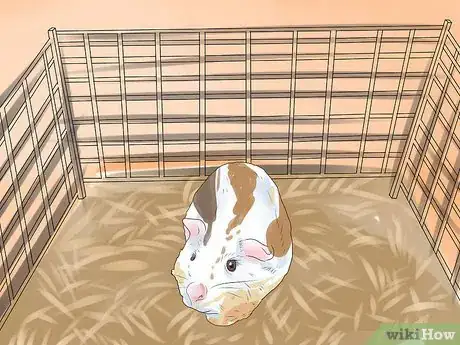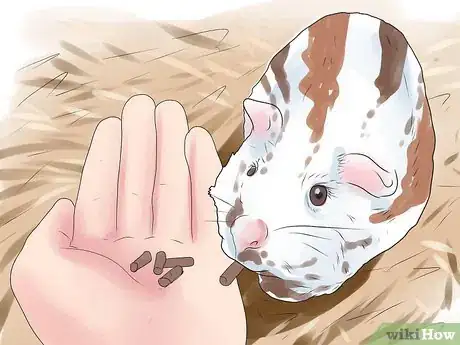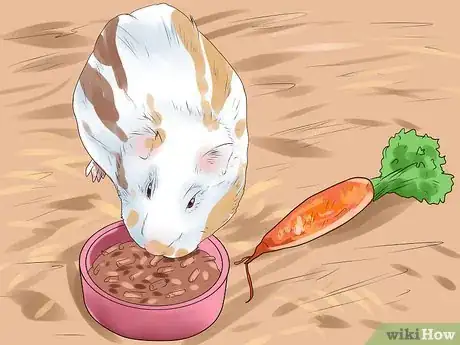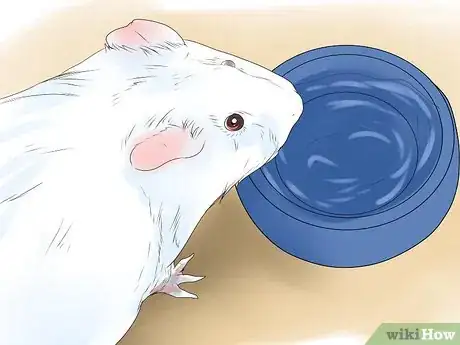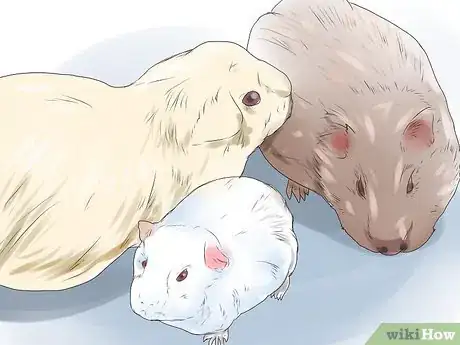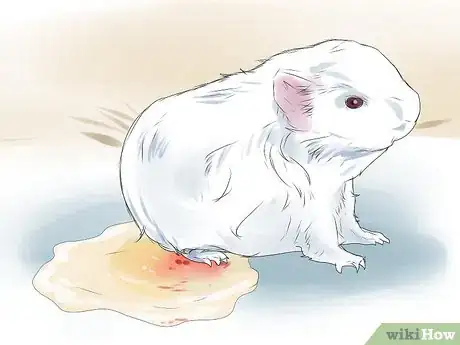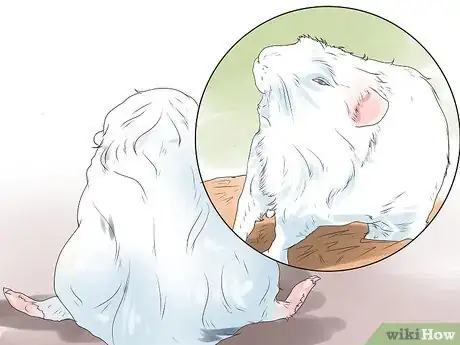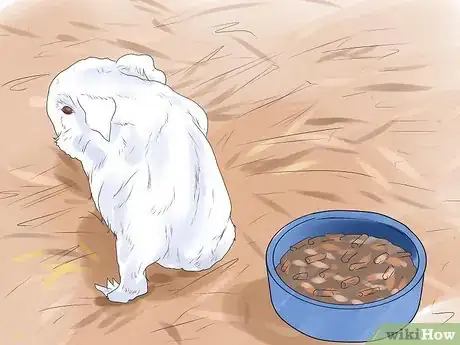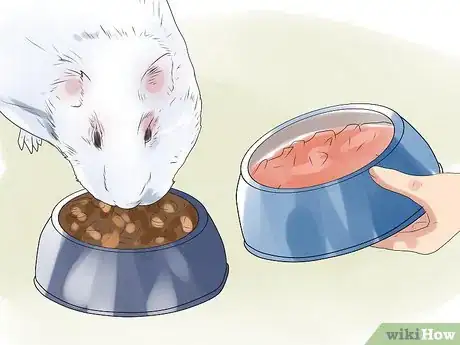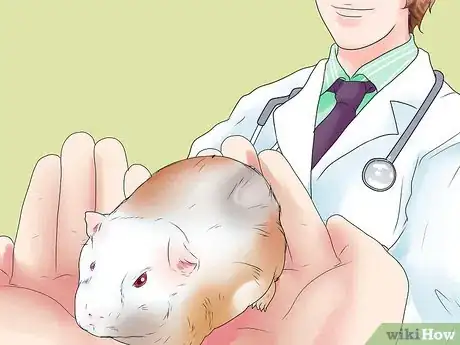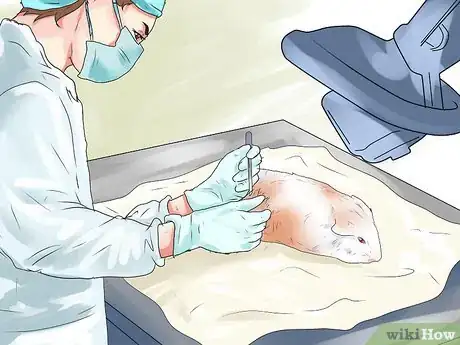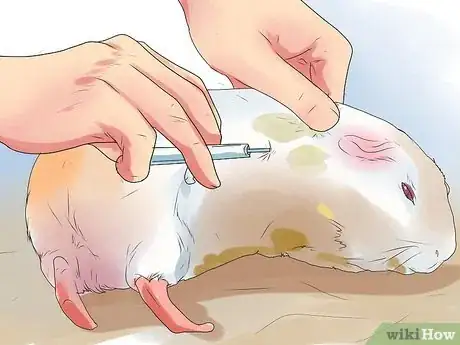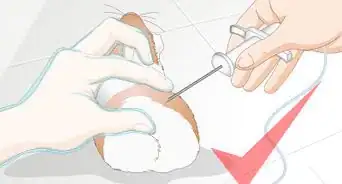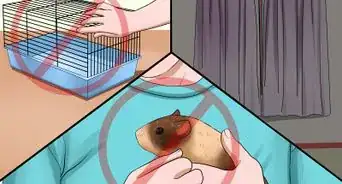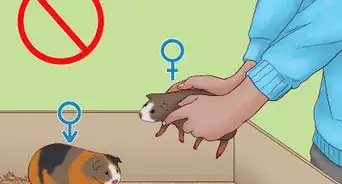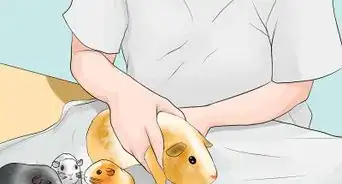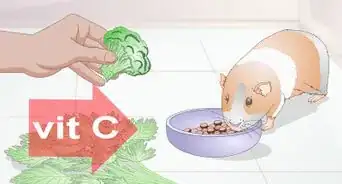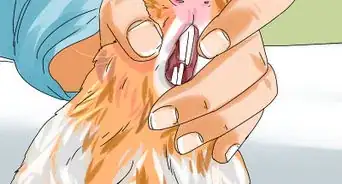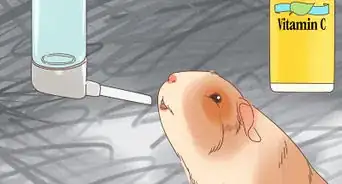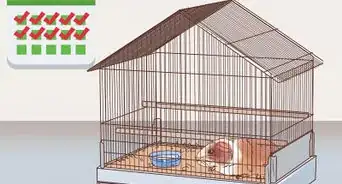This article was co-authored by Pippa Elliott, MRCVS. Dr. Elliott, BVMS, MRCVS is a veterinarian with over 30 years of experience in veterinary surgery and companion animal practice. She graduated from the University of Glasgow in 1987 with a degree in veterinary medicine and surgery. She has worked at the same animal clinic in her hometown for over 20 years.
wikiHow marks an article as reader-approved once it receives enough positive feedback. In this case, 100% of readers who voted found the article helpful, earning it our reader-approved status.
This article has been viewed 63,805 times.
If you suspect your guinea pig has bladder stones, you're likely worried. Bladder stones develop when minerals from the guinea pig's food precipitate out of its urine and build up. The bladder stones may tumble around in the guinea pig's bladder, causing pain and irritation, or they may block the urethra. Fortunately, you can take measures to reduce the chances your guinea pig will develop bladder stones. If your guinea pig shows symptoms of bladder stones, get it treatment immediately.
Steps
Preventing Bladder Stones
-
1Keep your guinea pig on clean, dry bedding. Wet bedding discourages the guinea pig from emptying its bladder, which causes it to hold its urine longer. Additionally, dirty bedding is a breeding ground for bacteria. These bacteria can then go up the urethra and into the bladder, causing an infection.[1]
-
2Feed your guinea pig a low or reduced calcium diet. The majority of guinea pig bladder stones are calcium-based (calcium oxalate or calcium phosphate). If the guinea pig is fed a high calcium diet, its body becomes saturated with calcium and is more likely to form deposits in its urine. Feed your guinea pig well-balanced pellet foods that are calcium controlled.[2]
- Good food options include the Oxbow range of herbivore foods, as well as Cavy cuisine and Bunny Basics.
- Avoid foods high in calcium like alfalfa hay, spinach, celery, parsley, and strawberries. Exclude these items from your pig’s diet or limit them as a once a week treat.
- Select a timothy hay-based pellet brand, such as oxbow adult guinea pig pellets. Always check the labels at the back of the box, as most pellet brands are alfalfa hay-based, which is higher in calcium.
Advertisement -
3Give your pig a variety of reduced calcium foods. As any food is likely to be higher in certain minerals than others, vary up the types of foods you give your pig. For example, carrots are high in oxalate, a buildup of which can cause bladder stones. If you feed your pig carrots every day there is a risk of inducing oxalate bladder stones. Alternating or varying up how often you give your pig carrots gives the oxalate time to wash out of your guinea pig’s system rather than build up.[3]
- Never give your pig the same food two days running to allow the system to cleanse itself in between eating times.
-
4Encourage your guinea pig to drink plenty of water. Place multiple water bottles in your guinea pig's run and hutch so it will drink more water. This will help to keep his urinary tract flushed through and healthy.[4]
- This is especially important for a group of guinea pigs housed together, because the head pig may dominate a lone drinker and prevent others from having access to water.
Recognizing the Signs of Bladder Stones
-
1Check if your guinea pig has parents with a history of bladder stones. It is not entirely clear why some guinea pigs suffer from bladder stones though they still maintain the same diet as guinea pigs who do not have stones. One theory is that there is a genetic component that influences the way your guinea pig processes the minerals in food. If these minerals are not processed properly, they are deposited as a sludge or crystals in the bladder and may then stick together to form stones.
-
2Pay attention to your guinea pig’s urine for any blood. You may notice your guinea pig has darker colored pee containing the occasional blood clot on his sawdust. Blood in his urine is caused by the bladder stones rubbing the bladder lining and causing inflammation.[5]
- If you can’t tell what your pig’s pee looks like against the sawdust, replace the sawdust with newspaper as it is easier to see any red-tinged discoloration on the paper.
-
3Notice if your pig squeals when he tries to pee or spends a lot of time squatting. If the stone moves from the bladder into the urethra, then the condition can become more serious and more painful for your pig. Unable to pass water, your guinea pig will become distressed, and may be vocal or squeal, as well as squat.[6]
- Untreated, your pig will continue to strain to pass urine, but to no avail. The urine builds up in the bladder and refluxes back up into the kidney. The guinea pig then becomes toxic. If you notice your pig displaying symptoms like extreme lethargy, stupor, or lapsing into unconsciousness, take him to your vet for medical care immediately.
-
4Check to see if your guinea pig has stopped eating or has lost weight. Some guinea pigs become so preoccupied with trying to urinate that their food intake is reduced and they lose weight.[7]
- If your guinea pig isn't eating, take it to the vet immediately. Even 24 hours without eating can cause serious complications for your pet, so this is an emergency situation.
Managing Your Guinea Pig’s Bladder Stones
-
1Change your guinea pig’s diet. Once the stones have formed in your pig’s bladder, there is no diet that will cause the stones to dissolve. Guinea pigs differ from cats and dogs, as certain stones in their bodies can dissolve with a special prescription diet. But a change in your pig’s diet will lessen the build-up of more stones or a recurrence of stones in your pig’s bladder.[8]
-
2Get your pig’s urine checked for a urinary tract infection. Typical guinea pig urine is alkaline with a pH of 8.5, but if the pH of their urine changes, this can lead to the deposition of certain minerals. Urinary tract infections can lead to the formation of bladder stones because this infection causes your guinea pig’s urine to become more acidic, thereby encouraging stone formation in his bladder.[9]
- A guinea pig with stones should either have urine sent for culture or be treated with a course of antibiotics on the assumption that a urinary tract infection is present.
-
3Consider surgical removal of the stones. Removing the stones through surgery is a viable option but surgery without preventative measures may only benefit the animal for a relatively short period of time, likely 3-4 weeks.[10]
- It is sad but true that despite a successful surgery, guinea pigs are associated with a high recurrence rate of stones, perhaps even despite your best efforts to reduce that likelihood.
-
4Talk to your vet about euthanization if your pet doesn't recover. Sometimes treatment can't cure your guinea pig. Additionally, some guinea pigs are prone to recurring bladder stones. Unfortunately, your pet will be very ill if the bladder stones remain, so euthanizing your guinea pig may be the best option. Your vet can help you make the best decision for your pet.[11]
Warnings
- Bladder stones can quickly become an emergency situation if they block the urethra. If you suspect your pet has bladder stones, take it to the vet immediately for treatment.⧼thumbs_response⧽
References
- ↑ Urolithiasis in Rabbits and Guinea Pigs. Heide Hoefer.DVM, Diplomate. ABVP Proceedings of the NAVC. 2006:
- ↑ Composition and Characteristics of Urinary Calculi from Guinea Pigs. Hawkins, Ruby, Drazenovich, & Westropp. JAVMA. 2009: 234:214
- ↑ Composition and Characteristics of Urinary Calculi from Guinea Pigs. Hawkins, Ruby, Drazenovich, & Westropp. JAVMA. 2009: 234:214
- ↑ Urolithiasis in Rabbits and Guinea Pigs. Heide Hoefer.DVM, Diplomate. ABVP Proceedings of the NAVC. 2006:
- ↑ Composition and Characteristics of Urinary Calculi from Guinea Pigs. Hawkins, Ruby, Drazenovich, & Westropp. JAVMA. 2009: 234:214
- ↑ Composition and Characteristics of Urinary Calculi from Guinea Pigs. Hawkins, Ruby, Drazenovich, & Westropp. JAVMA. 2009: 234:214
- ↑ Composition and Characteristics of Urinary Calculi from Guinea Pigs. Hawkins, Ruby, Drazenovich, & Westropp. JAVMA. 2009: 234:214
- ↑ Composition and Characteristics of Urinary Calculi from Guinea Pigs. Hawkins, Ruby, Drazenovich, & Westropp. JAVMA. 2009: 234:214
- ↑ Composition and Characteristics of Urinary Calculi from Guinea Pigs. Hawkins, Ruby, Drazenovich, & Westropp. JAVMA. 2009: 234:214
